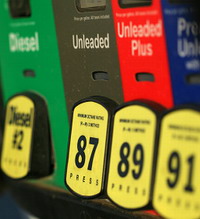The falling prices at the pump have been welcome news for drivers and consumers. It’s hard not to feel like gas prices are the ultimate determinant of our economic well-being. When they go up, the economy stalls, such as in the 1970s, early 2000s, and then the recent economic malaise following the Great Recession. And when they go down, the economy seems to hum, like in the 1990s and now with our increasingly robust economic recovery. Cheap energy underpins virtually everything we do, and transportation fuels are the key inputs for our industrial machine.
We know this industrial production and activity comes at an environmental cost. But is there reason to believe this time is different? There’s no doubt cheap gas means more pollution, at least in the short run. It’s encouraging less efficient vehicle purchases (SUV sales are up although electric vehicle sales so far are holding steady), more driving, and more economic activity that tends to produce more carbon emissions.
 But there are environmental positives, some immediate and some more potential. In the immediate future, cheap oil means environmentally destructive oil and gas extraction methods, such as fracking, become too expensive to continue relative to the cheap global price of oil. The decrease in investment in these methods could have long-term consequences on supply, once this oil boom fades. And since these extraction methods often produce both oil and natural gas, the slowdown could drive up natural gas prices as a byproduct. That in turn could make renewables more cost-competitive and possibly discourage wasteful gas consumption, spurring efficiency overall.
But there are environmental positives, some immediate and some more potential. In the immediate future, cheap oil means environmentally destructive oil and gas extraction methods, such as fracking, become too expensive to continue relative to the cheap global price of oil. The decrease in investment in these methods could have long-term consequences on supply, once this oil boom fades. And since these extraction methods often produce both oil and natural gas, the slowdown could drive up natural gas prices as a byproduct. That in turn could make renewables more cost-competitive and possibly discourage wasteful gas consumption, spurring efficiency overall.
The other long-term potential environmental good is that a booming economy is a big factor in making voters more likely to support environmental measures (the so-called “affluence hypothesis”). So as many people experience rising income or more disposable cash from cheaper energy, environmental leaders should take the opportunity to solidify environmental policies. In California, that would mean legislating 2030 and maybe even 2050 greenhouse gas reduction goals to extend AB 32 (the state’s climate law) authority beyond 2020. That could also mean switching from the gas tax to a vehicle miles traveled tax to develop a more stable source of funding to repair existing roads and pay for new transit, pedestrian and bike infrastructure. Legislators could develop a permanent funding source to help build more affordable housing near transit. And it could also mean reforming Proposition 13 to allow local governments to raise voter-approved revenue for transit with a 55% majority.
At the national level, a booming economy could undermine efforts to rollback EPA regulations to reduce pollution from power plants, while correspondingly lead to more support for a nationwide vehicle miles traveled tax to fund transportation. (I’d love a national policy on carbon, too, but I don’t think that even a booming economy could overcome the structural impediments that disproportionately empower rural, fossil-fuel dependent states in the federal decision-making process.) And maybe a booming economy could make it easier for the Obama Administration to negotiate a more meaningful international climate treaty in Paris next year.
So the potential upsides of cheap gas are huge, while the known immediate downsides may be unavoidable. Let’s hope our environmental leaders capitalize on this opportunity while they have it. Because if history teaches us anything, it’s that cheap gas never lasts.
Leave a Reply
You must be logged in to post a comment.


